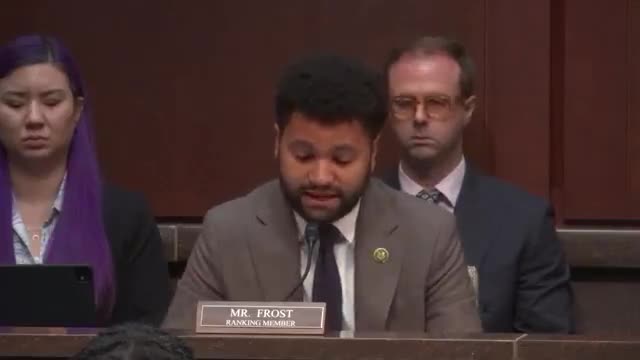Congress questions CBO's revised cost analysis of Inflation Reduction Act
May 22, 2025 | Oversight and Reform: House Committee, Standing Committees - House & Senate, Congressional Hearings Compilation
This article was created by AI summarizing key points discussed. AI makes mistakes, so for full details and context, please refer to the video of the full meeting. Please report any errors so we can fix them. Report an error »

In a recent meeting of the U.S. House Committee on Oversight and Government Reform, tensions flared as lawmakers debated the implications of the Inflation Reduction Act (IRA) on energy and healthcare. The atmosphere was charged, with representatives passionately defending their positions on the controversial legislation that aims to lower pharmaceutical costs and reduce the federal deficit.
One key moment came when a Democratic representative challenged the narrative that government intervention in drug pricing would stifle pharmaceutical research and development. Citing a Congressional Budget Office (CBO) estimate, the representative argued that the pharmaceutical industry, which reportedly earned around $600 billion in 2023, should not be prioritized over the financial burdens faced by seniors in need of affordable medications. This assertion highlighted a growing frustration among lawmakers who feel that the needs of constituents are being overshadowed by corporate interests.
The discussion then shifted to the financial implications of the IRA itself. A Republican representative raised concerns about the CBO's shifting estimates regarding the act's impact on the federal deficit. Initially projected to reduce the deficit, the IRA's costs have now been called into question, with some estimates suggesting it could increase the deficit by hundreds of billions. This prompted calls for a comprehensive reanalysis of the legislation, as lawmakers expressed skepticism about its long-term viability and effectiveness.
As the meeting progressed, the complexities of the IRA were laid bare. The challenges surrounding the implementation of certain tax provisions, such as the corporate alternative minimum tax and buyback tax, were discussed. Lawmakers noted that the IRS had yet to finalize regulations for these taxes, raising further doubts about the act's intended financial outcomes.
In this charged environment, the meeting underscored the ongoing debate over the balance between government regulation and corporate responsibility in both the energy and pharmaceutical sectors. As lawmakers grapple with these issues, the future of the IRA remains uncertain, leaving many to wonder how it will ultimately affect both the economy and the lives of everyday Americans.
One key moment came when a Democratic representative challenged the narrative that government intervention in drug pricing would stifle pharmaceutical research and development. Citing a Congressional Budget Office (CBO) estimate, the representative argued that the pharmaceutical industry, which reportedly earned around $600 billion in 2023, should not be prioritized over the financial burdens faced by seniors in need of affordable medications. This assertion highlighted a growing frustration among lawmakers who feel that the needs of constituents are being overshadowed by corporate interests.
The discussion then shifted to the financial implications of the IRA itself. A Republican representative raised concerns about the CBO's shifting estimates regarding the act's impact on the federal deficit. Initially projected to reduce the deficit, the IRA's costs have now been called into question, with some estimates suggesting it could increase the deficit by hundreds of billions. This prompted calls for a comprehensive reanalysis of the legislation, as lawmakers expressed skepticism about its long-term viability and effectiveness.
As the meeting progressed, the complexities of the IRA were laid bare. The challenges surrounding the implementation of certain tax provisions, such as the corporate alternative minimum tax and buyback tax, were discussed. Lawmakers noted that the IRS had yet to finalize regulations for these taxes, raising further doubts about the act's intended financial outcomes.
In this charged environment, the meeting underscored the ongoing debate over the balance between government regulation and corporate responsibility in both the energy and pharmaceutical sectors. As lawmakers grapple with these issues, the future of the IRA remains uncertain, leaving many to wonder how it will ultimately affect both the economy and the lives of everyday Americans.
View full meeting
This article is based on a recent meeting—watch the full video and explore the complete transcript for deeper insights into the discussion.
View full meeting